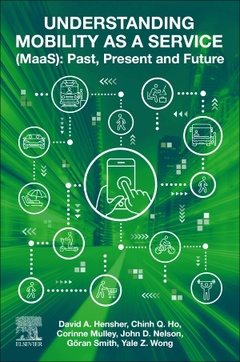Understanding Mobility as a Service (MaaS) Past, Present and Future
Auteurs : Hensher David A., Mulley Corinne, Ho Chinh, Wong Yale, Smith Göran, Nelson John D.

The widespread adoption of smartphones, ridesharing and carsharing have disrupted the transport sector. In cities around the world, new mobility services are both welcomed and challenged by regulators and incumbent operators. Mobility as a Service (MaaS), an ecosystem designed to deliver collaborative and connected mobility services in a society increasingly embracing a sharing culture, is at the center of this disruption.
Understanding Mobility as a Service (MaaS): Past, Present and Future examines such topics as:
- How likely MaaS will be implemented in one digital platform app
- Whether MaaS will look the same in all countries
- The role multi-modal contract brokers play
- Mobility regulations and pricing models
- MaaS trials, their impacts and consequences
Written by the leading thinkers in the field for researchers, practitioners, and policy makers, Understanding Mobility as a Service (MaaS): Past, Present and Future serves as a single source on all the current and evolving developments, debates, and challenges.
1. Overview of book 2. What is MaaS and how it fits into the transport landscape 3. Global debate and experience with MaaS 4. MaaS trials – what have we learnt? 5. What do we know about market interest and potential uptake 6. How might MaaS be best introduced to the market? 7. Institutional Barriers and Governance 8. MaaS and issues impacting the broader transport and societal goals 9. Future Challenges
Professor Emerita Corinne Mulley was the inaugural Chair of Public Transport at the Institute of Transport and Logistics Studies at The University of Sydney. Corinne is a transport economist, active in transport research at the interface of transport policy and economics, concentrating on specific issues relating to public transport. She has provided both practical and strategic advice to local and national governments on transport evaluation, including economic impact analysis, benchmarking, rural transport issues, public transport management and on Mobility as a Service (MaaS). Professor Mulley's research is
- Includes case studies to show how MaaS is delivered around the world
- Covers foundational aspects of MaaS, clarifying what it is for those new to the concept
- Offers an in-depth analysis on a wide range of MaaS topics including governance, contracts, consumer and supplier preferences, links to societal objectives, the role of trials, assessments, and more
Date de parution : 05-2020
Ouvrage de 204 p.
15x22.8 cm
Thème d’Understanding Mobility as a Service (MaaS) :
Mots-clés :
Accessibility; Aggregator; Autonomous vehicles; Broker; Business; Chapter outlines; Choice experiment; Conclusions; Congestion; Contract; Disruption; Evaluation; Future; Future of public transport; Future research; Global debate and MaaS; Governance; Health; Institutional barriers; Key themes; Levels of integration and MaaS; MaaS; MaaS adoption; MaaS definition; MaaS preferences; MaaS schemes; Mobility as a Service (MaaS); Modal efficiency; Overview of book; Potential uptake; Pricing reform; Sharing; Societal goals; Spatial; Subsidy; Supplier; Temporal; Trials; Willingness to pay



